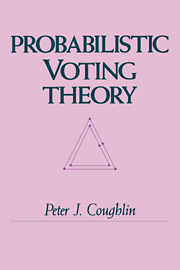
-
Select format
-
- Publisher:
- Cambridge University Press
- Publication date:
- 05 November 2011
- 30 October 1992
- ISBN:
- 9780511895395
- 9780521360524
- 9780521063296
- Dimensions:
- (228 x 152 mm)
- Weight & Pages:
- 0.534kg, 268 Pages
- Dimensions:
- (229 x 152 mm)
- Weight & Pages:
- 0.428kg, 268 Pages
You may already have access via personal or institutional login
Book description
Peter Coughlin provides the most comprehensive and integrated analysis of probabilistic voting models to date. Probabilistic voting theory is the mathematical prediction of candidate behaviour in, or in anticipation of, elections in which candidates are unsure of voters' preferences. The theory asks first whether optimal candidate strategies can be determined given uncertainty about voter preferences, and if so, what exactly those strategies are given various circumstances. It allows the theorist to predict what public policies will be supported and what laws passed by elected officials when in office and what positions will be taken by them when running in elections. One of the leading contributors to this rapidly developing literature, at the leading edge of public choice theory, Coughlin both reviews the existing literature and presents results that unify and extend developments in the theory.
Reviews
"The book by P. Coughlin, one of the principal contributors to the probalistic voting theory, can be recommended as an up-to-date monograph on the subject, containing both original results and well-annotated references." Journal of Classification
Contents
Metrics
Altmetric attention score
Full text views
Full text views help Loading metrics...
Loading metrics...
* Views captured on Cambridge Core between #date#. This data will be updated every 24 hours.
Usage data cannot currently be displayed.
Accessibility standard: Unknown
Why this information is here
This section outlines the accessibility features of this content - including support for screen readers, full keyboard navigation and high-contrast display options. This may not be relevant for you.
Accessibility Information
Accessibility compliance for the PDF of this book is currently unknown and may be updated in the future.


